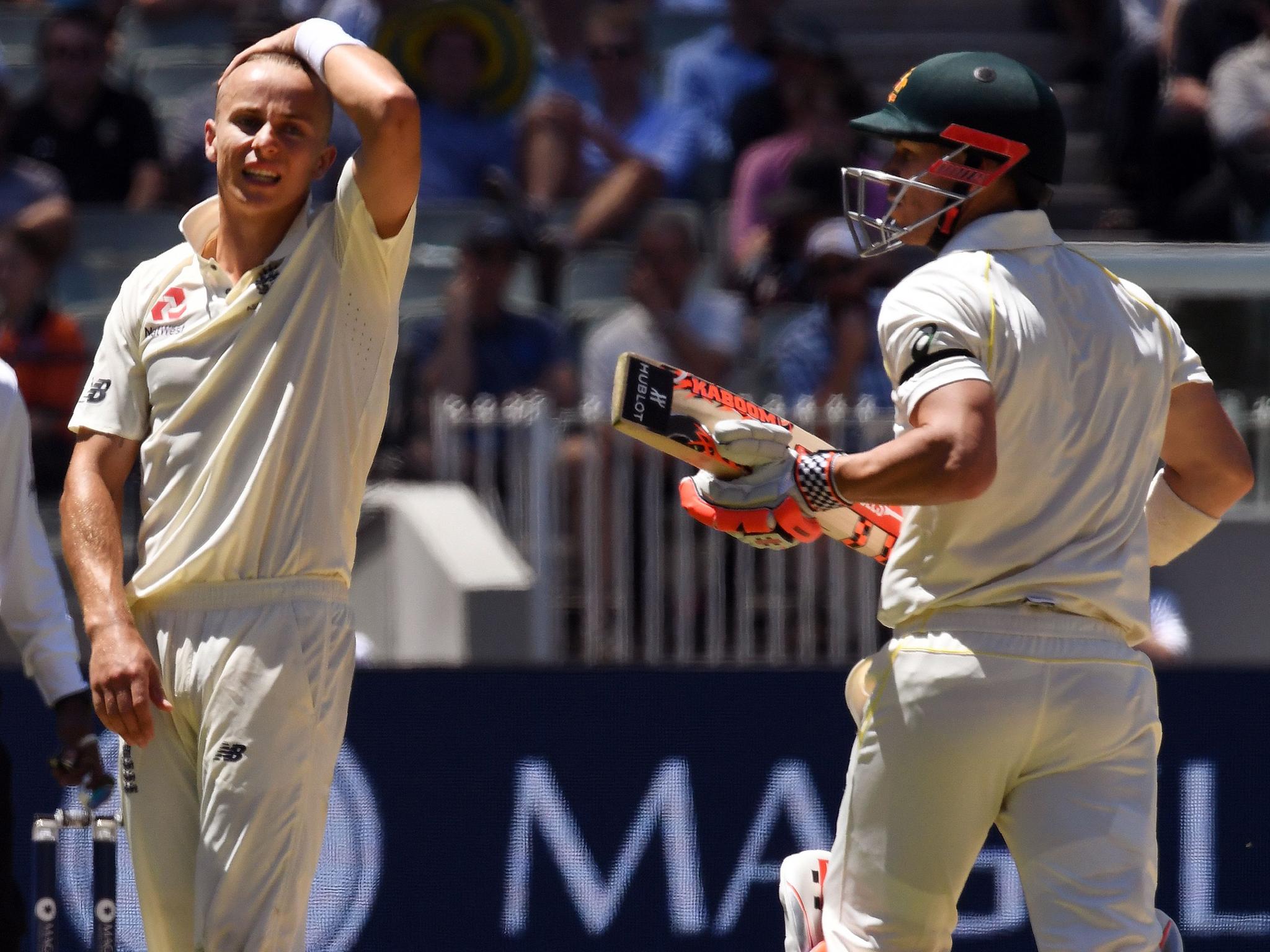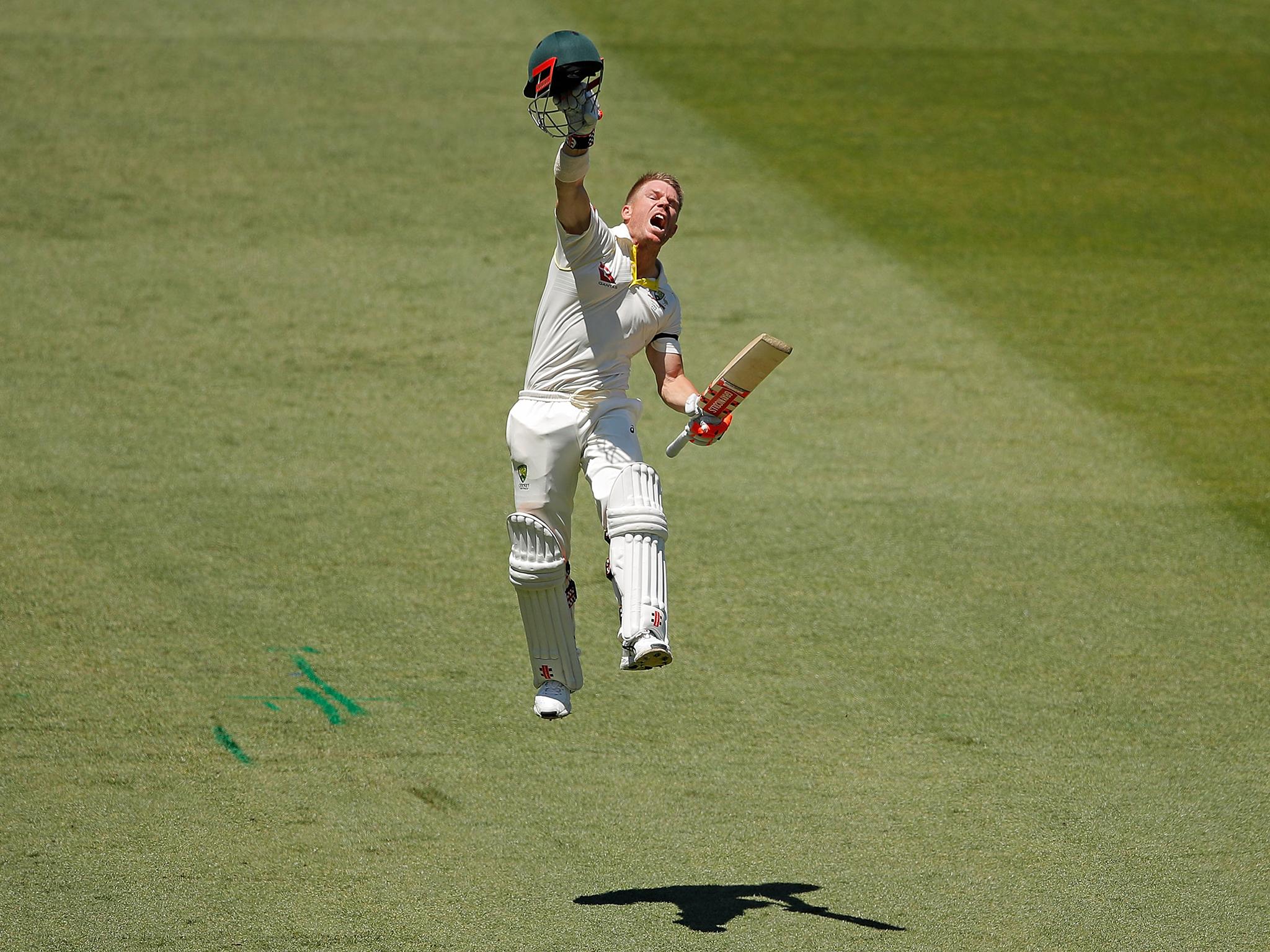David Warner century sees Australia pick up where they left off as Steve Smith continues to haunt England
Australia 244-3: England fought back in the final session but Warner's first century of the series and the presence of captain Smith suggests the tourist's hopes of a win are already over
Your support helps us to tell the story
From reproductive rights to climate change to Big Tech, The Independent is on the ground when the story is developing. Whether it's investigating the financials of Elon Musk's pro-Trump PAC or producing our latest documentary, 'The A Word', which shines a light on the American women fighting for reproductive rights, we know how important it is to parse out the facts from the messaging.
At such a critical moment in US history, we need reporters on the ground. Your donation allows us to keep sending journalists to speak to both sides of the story.
The Independent is trusted by Americans across the entire political spectrum. And unlike many other quality news outlets, we choose not to lock Americans out of our reporting and analysis with paywalls. We believe quality journalism should be available to everyone, paid for by those who can afford it.
Your support makes all the difference.A classic Test match opening day, one that for all its micro-dramas and flashes of excellence eventually settled into a sort of holding pattern, one that left the fundamentals of the series essentially unchanged. Australia on top, if not entirely dominant; England clinging on doggedly enough, if not really threatening to do much more than that. Most ominously of all for the tourists, this looks like another of those Test matches set to be defined by the dense and brilliant gravitational field of Steve Smith.
Smith was not the star of day one, as it happened. That was David Warner, whose 21st Test century, scored almost entirely in the morning session, gave Australia an early momentum that England spent most of the day trying to arrest. But Warner is out, and Smith is not, and so the Australian captain – 65 not out at stumps – still lurks, still casts his ominous shadow, a question to which we suspect we may already know the answer.
It was gritty rather than pretty stuff, with runs eked rather than leaked: on its Boxing Day showpiece, a somnolent MCG crowd of 88,172 was emptying well before the scheduled close of play, as punters began to think of better uses for the warm evening sunshine. The one exception was Warner, who alone of the batsmen on the pitch did not need to dig deep for his runs, but simply harvested them, gobbled them up, like coins in a Super Mario game.
At lunch he was on 83, and Australia were 102 without loss. England’s new-ball bowlers had been despatched, so too their change attack, and on the wide open spaces of the G, on a pitch flatter than the mood at Christmas lunch in the Damian Green household, they were already beginning to see visions. Dot balls felt like chances. False shots felt like wickets. Warner, scoring his runs almost entirely in front of square, was impervious, and a day of humiliation beckoned.

At which point, something strange happened. Cameron Bancroft had spent the morning looking like he was playing an entirely different sport to his opening partner: his feet moving uneasily, his bat sweeping down crookedly from around second slip, his drives lacking in power. Now, on 26, his luck finally ran out, shuffling across and trapped on the back pad by Chris Woakes. England sensed the briefest of openings, the creak of a door prising slightly ajar.
Having put the brakes on Bancroft, they now did the same to new batsman Usman Khawaja and finally even Warner, who as he neared his century ran headlong into England’s exquisite bespoke spoiling tactic. First Stuart Broad bowled him wide deliveries to a packed off-side field, playing on Warner’s ego. Then Joe Root started slowing things down between deliveries, playing on his patience. Then Tom Curran, on Test debut, bowled him a nifty slower ball, playing on his nerves. The minutes ticked by. The home crowd, sensing a pivotal passage of play, began to shift a little uncomfortably in its seats.
Finally, England’s plan paid off spectacularly. And then – all of a sudden – it didn’t.

On 99, Warner was tempted by Curran into playing the awkward leg-side jab that has led him astray in the past. The ball looped off the leading edge to a disbelieving Broad at mid-on. England’s delirious, overjoyed players swamped Curran, who could scarcely have imagined a more dramatic, decisive maiden Test wicket. As a disgusted Warner strode from the field, a replay on the big screen caught his eye. Curran’s effort ball had dragged his front heel marginally over the popping crease. No-ball!
The crowd roared. Warner turned smartly 180 degrees and marched back to the wicket, greeting Curran and Jonny Bairstow with a few choice words on his return. England’s huddle dispersed, distraught. The next ball, Warner flicked the ball off his hip to bring up a 21st Test century. England’s window of opportunity seemed to have slammed shut for good.

And yet, they refused to let their hard work go unrewarded. Half an hour later and still going nowhere, Warner succumbed to a sublime cutter from James Anderson, poking at the ball and feeling the faintest click in his gloves as it whooshed through to Bairstow. England finally had their man, achieving what few teams manage to do here – strangle Warner to death. His last 16 runs had taken 56 balls. Australia trudged off for tea having scored 43 runs at just 1.7 per over in the afternoon session.
England’s tails were up. Broad joined the party after tea, hitting 89mph in a classic Broad spell: full length, good aggression, just enough movement. Khawaja was caught behind for 17 – Broad’s first wicket after 69 wicketless overs, going back to the first innings at Adelaide – and Shaun Marsh very nearly went first ball, trapped on the crease and saved on review by an ‘umpire’s call’ on height.

Even on this most glorious of Melbourne days, however, there was still a dark cloud lurking on England’s horizon: Smith. Twitching and flexing, still there, still untroubled: Smith. Still scoring pretty much where he wanted, still as impossible to shift as a stain on the cooker: Smith. Like a car alarm in the night, like an unpleasant smell in a lift, like raw onion in a salad, like a missing element in the Periodic Table: impossible to ignore, impossible to confront, impossible to pin down. He reached 30 in roughly the time it took you to read this slightly indulgent paragraph.
For all that, England stuck to their tasks well. Anderson found some reverse nip with the old ball. Woakes started poorly but found his range. The debutant Curran, meanwhile, was impressive: the slowest of England’s four seamers, yet with the ability to make the ball zip just a little off the surface, almost as if delivering it with top-spin. He bowled a probing line, a well-disguised slower ball and on another day might have claimed a first Test wicket.

The exception, once more, was Moeen Ali: a bowler who you sense Australia’s batsmen are holding in ever deeper contempt as the series progresses. He was whacked, driven and milked during the six overs he was given, and perhaps the most telling statistic of all is that when he was withdrawn the gentle leg-spin of Dawid Malan was given seven overs, which he bowled with control and aplomb. Root’s trust in Moeen is clearly eroding. It felt like a watershed moment.
And so, with Marsh accumulating steadily at the other end, Smith glided to stumps, a man who – in more than one sense – had all the time in the world. Smith’s strategy and Australia’s will be nothing more complex than to bat and bat and bat: weakening England’s joints, weakening their resolve. England still do not look like a side capable of taking 20 wickets – not 20 Australian ones, anyway – but on this surface they certainly have enough batting quality to grind out a stultifying draw. Whether they have the toughness and composure to do so, we may not find out until very late on day two.
Join our commenting forum
Join thought-provoking conversations, follow other Independent readers and see their replies
Comments